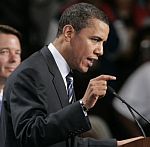The Armenian coalition government decided to shelve the approval of the protocols regarding the improvement of Turkish-Armenian relations.
The protocols were signed by Turkey and Armenia on 10 October 2009 in Zurich. They envisage the development of diplomatic relations between both countries. The protocols were to be enforced after they would have passed through both parliaments. Neither Turkey nor Armenia has approved the protocols.
The coalition government in Armenia consists of the Armenian Republican Party, the Party for a Prosperous Armenia and the Law State Party. As reported by the Armenian "A1+" media agency, the coalition government stated in a joint announcement that they decided to take the protocols off the parliament's agenda until Turkey refrains from putting forward preconditions regarding the approval.
The parties declared that they do not accept the fact that Turkey's Prime Minister Recep Tayyip Erdoğan consistently links the issue with the Nagorno-Karabagh conflict between Armenia and Azerbaijan.
Armenian President Serzh Sargsyan, who just came back from visits to the USA and Russia, held a meeting on the protocols with the Armenian Security Council, which includes the political leaders of the coalition. In a press release made after the meeting, President Sargsyan said that the country did not drop out of the process of normalizing relations with Turkey, but that it was suspended for now.
Sargsyan: Reasonable time has been exceeded
Sargsyan stated that Turkey was claiming preconditions and that a reasonable time for the approval of the protocol had been exceeded. The president's speech to the nation made yesterday (22 April) can be briefly summarized as follows:
Turkey deliberately prolonged the procedure: Turkey did everything to pass time for a whole year and to make the process fail. Turkey is not ready to advance the process without prerequisites. We think that a reasonable time has been exceeded. The application will not be accepted after 24 April, regardless of Turkey's issues. We think that this stage of the normalization process has been exhausted. (On 24 April 1915, 220 Armenian intellectuals living in Turkey were exiled and then killed.)
Open to sign: We want to maintain our position on the normalization of relations because we want peace.
If conditions are met: We still pursue the normalization of relations between Turkey and Armenia. Once we are convinced that Turkey is ready and that a new leadership in Ankara is ready for participating in the normalization processes, we will think of putting it forward again.
Gratitude to Abdullah Gül: At the end of the phase that started with the football match between Armenia and Turkey in September 2008 [which was attended by President Gül] I want to thank the Turkish President Abdullah Gül for his political correctness throughout the process and for the development of positive relations between us.
Erdoğan: Our commitment persists
After the Armenian decision, Prime Minister Erdoğan declared, "They know themselves how to manage the approval process". Erdoğan indicated that attitudes towards Armenia have not changed and that he assured Armenia of his commitment to enforce the protocols.
However, considering Karabakh, Erdoğan stated, "We explained how to reach peace in the region. And we are still determined".
Aktar: Process shelved by both sides
European Union expert Dr Cengiz Aktar evaluated the Armenian decision, "The process was shelved by both sides. The decision confirms this situation".
Regarding Armenian domestic politics, Aktar said that nobody expected such a statement from Armenia. According to EU expert Aktar, there might be two reasons for the decision. Sargsyan might have found such a step a significant measure to silence the opposition since Armenian domestic politics are currently jammed. The opposition had strongly objected the protocols.
Another reason might stem from Sargsyan's recent visit to the USA, where he might have been prompted accordingly by President Barack Obama. But this is very unlikely. Even if Obama talks about genocide, he would not say it in this situation, Aktar argued. (TK/VK)












